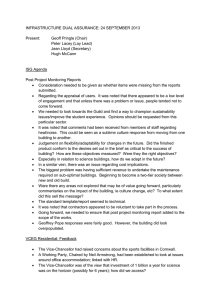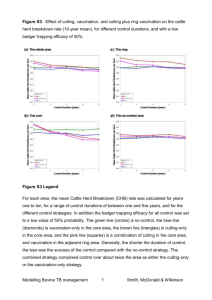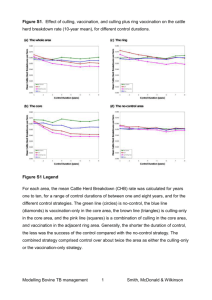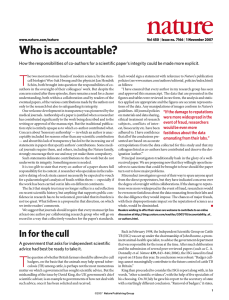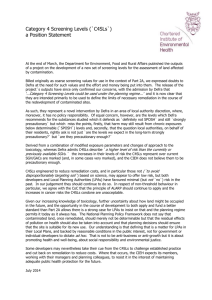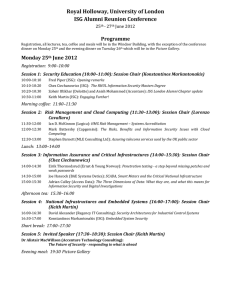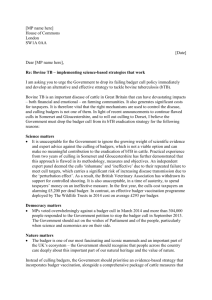Click to edit Master title style
advertisement
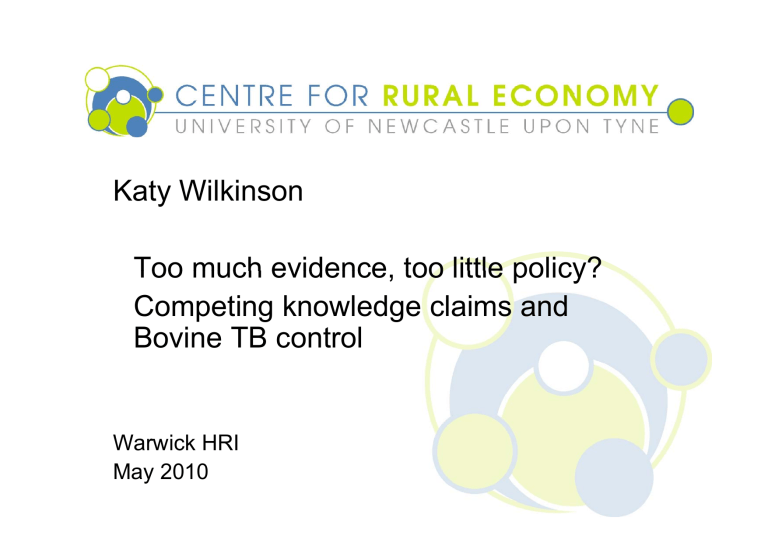
Click to edit Master title style Katy Wilkinson Too much evidence evidence, too little policy? Competing knowledge claims and Bo ine TB control Bovine Warwick HRI May 2010 Introduction • Decade after Modernising Government • TB as a case study of EBPM • Structure of the paper – Theory of EBPM – Bovine TB storyy since 1997 – EBPM reconsidered Evidence Based Policy Evidence-Based Policy-Making Making • Modernising Government white paper • Central tenets: – Policies shaped by evidence – Measured M db by results lt nott activity ti it – Flexible and innovative – More new ideas, more willingness to question inherited ways y of doing g things g • Influenced by BSE experience Defra’s Defra s Use of Science • 2800 scientists i ti t and d vets t iin D Defra f • 7000 more in Defra’s agencies g and NDPBs • Raft of policy documents – Delivering the Evidence (2003) – Evidence and Innovation Strategy (2004) – Development and Use of Scientific Advice (2004) – Science Meets Policy (2005) – Etc Et Benefits of EBPM • Basis in evidence-based medicine: g of p problems “diagnosis” • Depoliticises decision-making – Policy P li placed l db beyond d political liti l d debate b t – Political decisions reframed as technical/scientific questions – Blame shifting g • Certainty in policy-making BTB prior to 1997 • Growing incidence of disease + increasing government spending g p g=p pressure to do something • Highly contested link between badgers and TB • No rigorous scientific proof • Commissioning of Sir John Krebs report Krebs and the RBCT • • • • Recommended systematic scientific experiment g Culling g Trials ((RBCT)) Randomised Badger Independent Scientific Group (ISG) Compared effectiveness of proactive culling culling, reactive culling and no culling • Some modifications made to encourage public support • Nevertheless, portrayed as objective science Public consultation dispute • Initial conclusions of the RBCT: perturbation effect means culling p g can increased TB spread • Defra announces consultation on culling • Dispute between Defra and ISG over representation of scientific advice • 47,000 47 000 responses responses, 95 95.6% 6% opposed to badger culling Veterinary expertise • Final ISG report confirms initial findings • Creation of Tuberculosis Advisory Group (TBAG), veterinarian-led • Succeeded S d db by T Tuberculosis b l i Eradication E di ti Group (TBEG) • Vets (through BVA) consistently in favour of culling • Emphasis on “practical wisdom” Challenging the ISG • Asked to report on ISG science; published p in same week as ISG final report • King questioned ISG findings and advocated badger culling • ISG criticised King for “superficial” and “very selective” report • Implication that Defra deliberately tried to undermine ISG Why more evidence? • ISG scientific evidence has, to an extent, p y NFU)) silenced critics ((especially • However, doesn’t lead to any obvious, workable policy options • Cattle based measures not working well, vaccine still being developed Depoliticisation Repoliticisation Depoliticisation, • D Depoliticisation liti i ti nott possible ibl iin th the case off BTB • Increasingly fragmented and contested gives p power to Defra’s evidence base g critics, but no firm justification for policy • ‘Repoliticisation’ Repoliticisation is necessary: taking a difficult decision that possibly ignores the evidence • Welsh example increases demands for action ti Conclusion • Following decades of inaction, the RBCT seemed to offer the magic bullet Defra wanted • But lack of obvious policy options meant that hoped-for depoliticisation was not possible • Re-opening of the evidence base, but high public spending and profile of scientists means scrutiny of ministers remains • Evidence can inform decision-making decision-making, but can’t can t eliminate decisions themselves! References • M Flinders and J Buller (2006) ‘Depoliticisation: Principles, tactics and tools’ British Politics 1.3 • S Hinchliffe (2001) ‘Indeterminacy in-decisions – science policy and politics in the BSE crisis’ science, crisis Transactions of the Institute of British Geographers 26.2 • G Majone (1989) Evidence, Argument and Persuasion in the Policy Process. Yale University Press.
